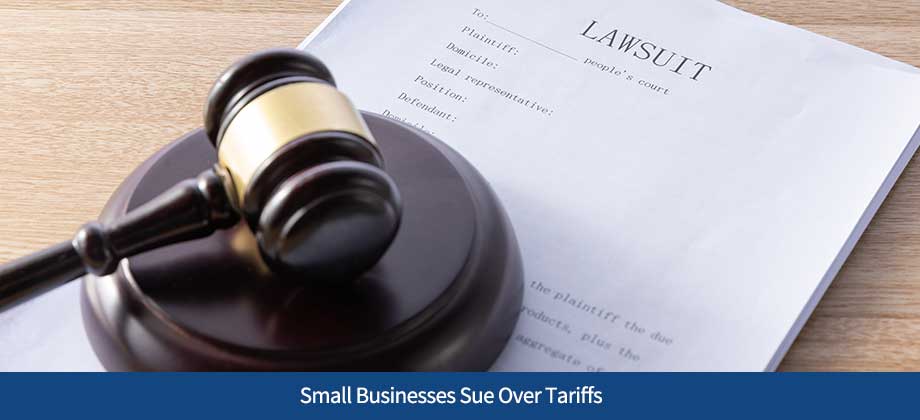Small Businesses Sue Over Tariffs

Tariffs may seem like a government tool to protect local industry, but they often have unintended consequences that ripple through the economy. For many small business owners, these consequences are hitting too close to home. Recently, several small businesses joined forces to challenge the Trump administration’s authority to levy tariffs, arguing that these policies are causing undue harm to their operations.
This blog will explore the impact of tariffs on small businesses, the recent legal battle, and strategies entrepreneurs can use to adapt during such economic uncertainties.
What Are Tariffs and Why Do They Matter?
A tariff is a tax or duty imposed by a government on imported goods. While they are typically positioned as a way to protect domestic industries and jobs, tariffs can lead to an increase in costs for businesses and consumers. When small businesses import goods or raw materials for production, these additional costs can quickly erode profit margins.
How Tariffs Hit Small Businesses
Unlike large corporations that have the resources to absorb higher costs or shift production to other countries, small businesses are often left with limited options:
Rising Costs of Goods
Small businesses reliant on imports face higher costs for materials, making it difficult to price products competitively.
Disrupted Supply Chains
Tariffs create uncertainty in the supply chain, leading to delays and expensive alternatives.
Reduced Consumer Access
Increased costs often translate to higher prices for customers, which can reduce demand.
Narrower Margins
For businesses with tight budgets, tariffs can eat into already thin profit margins, forcing some to close their doors.
Legal Action Against Tariffs
Recently, five small businesses filed a lawsuit in the U.S. Court of International Trade, arguing that the Trump administration overstepped its legal authority by imposing widespread global tariffs without congressional approval. This case shines a spotlight on the vulnerabilities of entrepreneurs during periods of shifting trade policies.
While it’s too early to predict the outcome of this legal battle, it signifies growing discontent among small businesses over economic decisions made without their interests in mind.
Strategies for Small Businesses to Navigate Economic Uncertainty
If tariffs and other economic conditions are squeezing your business, here are some strategies to help adapt and thrive:
1. Diversify Your Supply Chain
Avoid overreliance on goods or materials from one country. Diversifying your suppliers can help mitigate the risks posed by future tariffs.
2. Explore Local Alternatives
Support local suppliers when possible. This not only reduces your exposure to tariffs but can also speed up your product timelines.
3. Raise Prices Strategically
If margins are under pressure, consider adjusting prices carefully. Communicate transparently with customers about the changes, highlighting quality, value, or services that set your product apart.
4. Use Financial Tools to Maintain Stability
A revolving line of credit can help small businesses manage cash flow during periods of uncertainty. For example, ARF Financial’s Bankroll Revolving Line of Credit offers flexibility with loan amounts up to $1,000,000, fixed repayment terms, and the ability to cover operational needs or unexpected expenses. Learn more here.
5. Leverage Community Support
Participate in local business groups or online forums to share challenges and collaborate on solutions. Organizations like the National Small Business Association (NSBA) can provide resources and advocacy during challenging economic times.
6. Lean Into Technology
Invest in tools that streamline operations, such as inventory management or customer relationship management (CRM) systems. Efficiency gains can help offset rising costs.
The Importance of Advocacy
The current lawsuit against tariffs highlights the need for collective action. While small businesses often lack the resources to lobby directly, industry associations and legal challenges like this one give entrepreneurs a voice in shaping policies that affect their livelihoods.
Advocacy isn’t just about courtrooms and campaigns; it’s also about educating lawmakers on the unique challenges small businesses face. If your business has been impacted, consider sharing your story with local representatives or joining industry-led advocacy initiatives.
Looking Ahead
Economic uncertainty is a challenge every entrepreneur will face at some point. Whether it’s tariffs, a recession, or shifting trade policies, resilience comes from being informed and proactive. Take steps now to minimize risks and position your business for growth, no matter what new obstacles arise.
If you’re seeking financial support to weather this storm, ARF Financial’s Bankroll Revolving Line of Credit can provide the flexibility small businesses need to adapt and thrive. Don’t wait for uncertainty to become a roadblock; plan for it today.
Your privacy is important to us. ARF Financial will never sell or rent your information to any third party. Click here for more information about our privacy policy. Image by wirestock on Freepik

